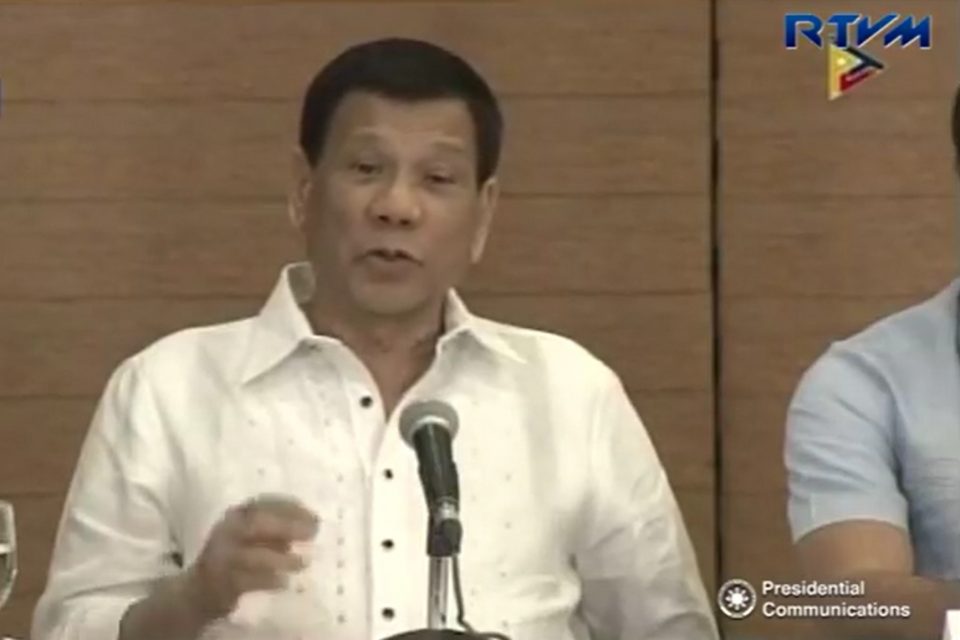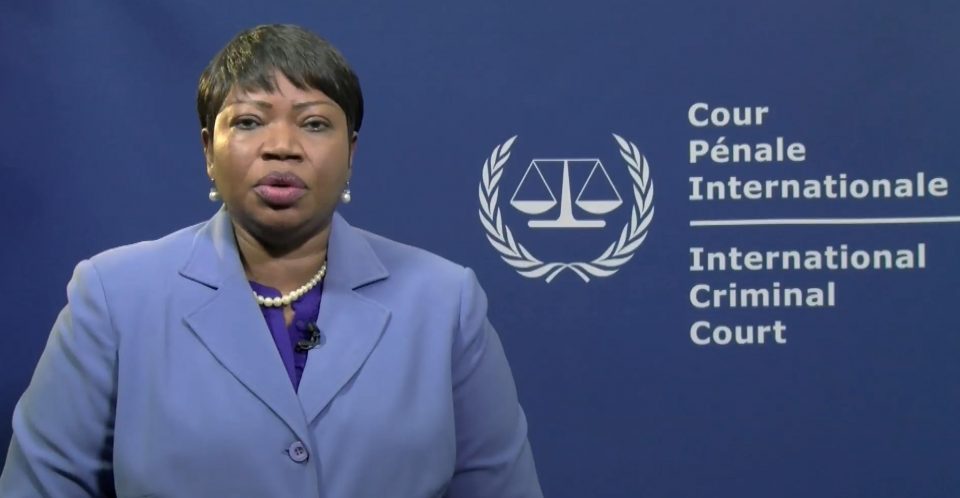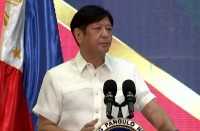
(Eagle News) – President Rodrigo Duterte said he would want to have a one-on-one talk with the prosecutor of the International Criminal Court (ICC) who has opened a preliminary examination on the complaint for alleged crimes against humanity that had been filed against him and 11 other officials.
This is so he could enlighten ICC Prosecutor Fatou Bensouda about the real situation in the country, as well as its laws where the ICC Statute is not yet a part of, he said.
In a press conference in Davao City, Duterte said ICC Prosecutor Bensouda should also understand that the treaty that created the ICC — although signed by the Philippines in 2011 — is not enforceable as a law in the Philippines and does not bind the country because it had not been published in any official gazette as is required under Philippine jurisprudence.
“May I lecture you,” the President said addressing the ICC prosecutor in a televised press conference.
“There is a Philippine Constitution, it provides for remedies to seek redress of grievance,” he said, referring to the constitutional right of Filipinos to petition the government for redress of grievances .
He explained how Philippine criminal laws are.
“You cannot escape liability by just pretending to be ignorant. So in order not to be ignorant we have to publish our penal laws, especially with punitive sanctions,” said Duterte, a veteran Philippine lawyer who had once served as a prosecutor in Davao City for several years before he was elected in 1988 as the City’s mayor.
“One of the fundamental requirements in a decent, in a humane society, in a democracy, is that you must know the law that you are violating,” Duterte said.
“Now, you decide a case in the international court like a common law,” he said.
He said the ICC can make a crime out of an act or a deed that would constitute as a crime.
“But these laws must be published in the official gazette, to be really effective laws.”
– “Rare privilege” to talk to ICC prosecutor-
The 72-year old Philippine leader who is known for his strong words, said he would welcome ICC prosecutor Fatou Bensouda in the country, and would like to enlighten her on the real situation when he talks to her personally.
“I hope you come, and I hope we can be together in one room. I hope I can have that rare privilege of talking to you. Tayo lang dalawa, the two of us in a room. I welcome you,” he said.
But Duterte said that if after he explains everything to the ICC prosecutor, and she still would insist on hailing him to trial, he would rather be executed in another country which would allow this.
“If you find me guilty, go ahead, find a country where they kill people with a firing squad. I am ready,” he said.
“I do not want imprisonment,” he said.
-Extrajudicial killing-
At the same time, Duterte also pointed out that even the matter of extrajudicial killing which his administration is accused of, has not been properly defined.
“But what is extrajudicial killing? There is no … provision of extrajudicial killing, it is not defined anywhere,” he said.
He then questioned why he would be accused of a crime that does not exist in the Philippines’ Revised Penal Code.
While treaties form part of the laws of the land, there was no publication of the treaty that formed the ICC, specifically the Rome Statute which is also known as the International Criminal Court Statute.
“Now the treaty says that we sign the treaty, we deliver the documents in Rome, ang sabi ninyo, but those laws were submitted to you, but were not published — yung definition of what are the crimes that you can take cognizant of,” he said addressing the ICC prosecutor in a televised press conference.
One of the fundamentals is really is that you have to publish it in the official gazette, which this government did not (do). Not my government, I did not sign it,” he said.
“Was there any publication? None,” Duterte stressed.
-The Rome Statute-
The Rome Statute was adopted at a diplomatic conference in Rome on 17 July 1998 and it entered into force on 1 July 2002.
Under the Rome Statute, the ICC can only investigate and prosecute the four core international crimes in situations where states are “unable” or “unwilling” to do so themselves.
The jurisdiction of the court is also complimentary to jurisdictions of domestic courts. The court has jurisdiction over crimes only if they are committed in the territory of a state party or if they are committed by a national of a state party.
ICC Prosecutor Bensouda said the “ICC would have jurisdiction over genocide, crimes against humanity and war crimes if committed on the respective territories of the Philippines” or by its respective nationals since the date when the Statute entered into force in each State, namely since 1 November 2011 in the case of Philippines.”

-Territorial jurisdiction applies-
But the Philippine president claimed the ICC cannot claim jurisdiction over the case under the rule on territoriality.
“Our principle of territoriality is that the crime must only be prosecuted in the place where the crime was committed,” he said.
The territorial principle is a principle of public international law under which a sovereign state can prosecute criminal offences that are committed within its borders.
Territorial jurisdiction also means that a criminal action should be filed in the place where the crime was committed, except as provided in the treaties and laws of preferential application, based on Article 2 of the Revised Penal Code.
Earlier, the President’s Spokesperson Harry Roque reiterated that the alleged deaths attributed to the administration’s campaign against illegal drugs were because of lawful police operations and therefore could not be regarded as attacks against civilians.
Roque clarified that no formal charges were filed against any official in government, since the preliminary examination only aims to determine if there is a reasonable basis to conduct a formal investigation.
“Lilinawin ko po, preliminary examination pa lang po ito. So wala po talagang nasasakdal dito. Pag-aaralan lang ng [ICC] Prosecutor ‘yung sitwasyon at titingnan kung mayroong reasonable basis to begin a preliminary investigation,” he said.
-Preliminary examination is not investigation, says ICC-
Prosecutor Fatou also issued a statement clarifying that a preliminary examination is not tantamount to an investigation.
“I emphasize that a preliminary examination is not an investigation but a process of examining the information available in order to reach a fully informed determination on whether there is a reasonable basis to proceed with an investigation pursuant to the criteria established by the Rome Statute,” she said in her statement issued February 8.
“Specifically, under article 53(1) of the Rome Statute, I, as Prosecutor, must consider issues of jurisdiction, admissibility and the interests of justice in making this determination,” she added.
The complaint before the ICC was filed by Atty. Jude Sabio, lawyer of a self-confessed hired killer in Davao City, Edgar Matobato, who had earlier appeared in a senate hearing that probed the alleged extrajudicial killings that he claimed was connected to the Philippine president when he was still the mayor of Davao City.
The senate, however, later questioned Matobato’s credibility as senators pointed out several inconsistencies in his testimony.
Matobato’s lawyer, Sabio, later filed the ICC complaint and included in it senator Richard Gordon, head of the senate blue ribbon committee, which questioned Matobato’s credibility, as well as then senator Allan Peter Cayetano who had delivered speeches defending Duterte against allegations of extrajudicial killings.
Nine other Philippine government officials, including the secretary of the Department of Justice and the government solicitor general, were also included in Sabio’s complaint to the ICC.
(Eagle News Service)







